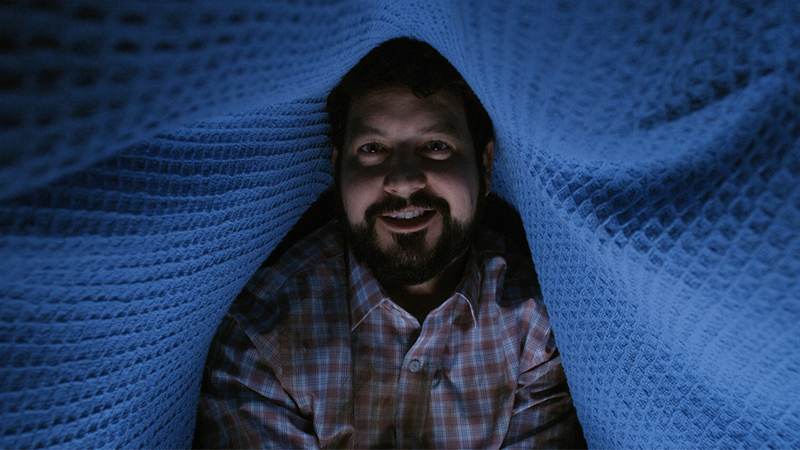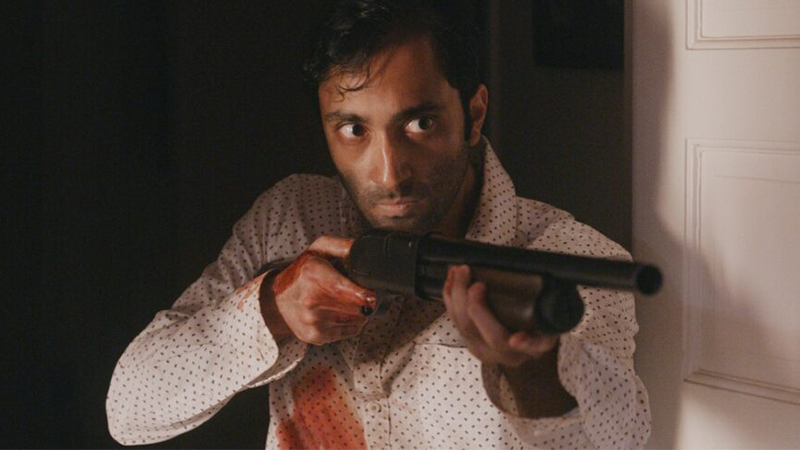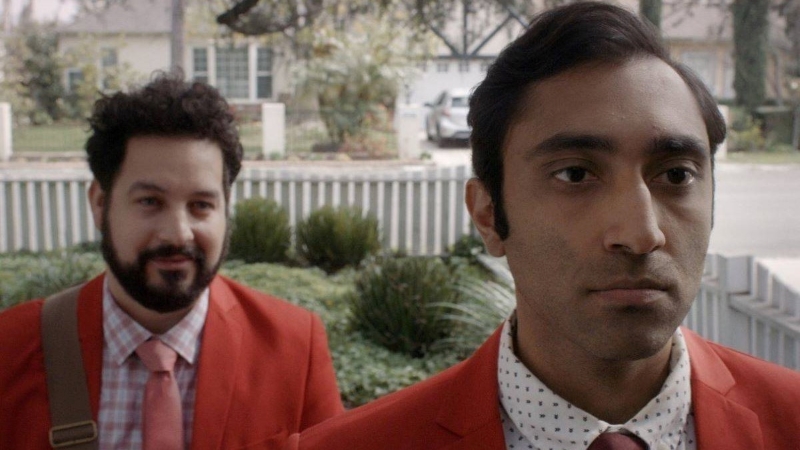ComingSoon Senior Editor Spencer Legacy spoke with Keeping Company stars Devin Das and Ahmed Bharoocha to discuss the dark comedy horror film, which is now available to purchase or rent through video-on-demand services. As a warning, this interview does contain spoilers for the film.
Spencer Legacy: Ahmed, what were your thoughts when you first read the script?
Ahmed Bharoocha: My character doesn’t make it to the end, but when I saw that, I just thought it was such a bold choice. I wasn’t sure if it was … I was like, no, no, he’s going to come back. And I just loved that they were like taking that big risk, and just killing the only hope in the movie. So I just thought that was just perfect direction for the dark comedy. It’s easy to pull it back and not do that. But I thought it was cool that they did that choice and I just thought the character was really funny and the script was really funny. It was just immediately and I already knew them. So I was like, “yeah!” I’m on board right away.
Devin, you also co-wrote the film, what was that process like?
Devin Das: I co-wrote it with Josh Wallace, who is the director of the film. Josh and I, for us, the movie started off as a broad buddy company. We wrote the movie with the intention of producing it. For Josh and I, it was kind of a film made out of necessity. We were like, “we need to make our first feature. We need to figure it out. We need to just do it on our own.” And it started off as a broad buddy comedy because Josh and I come from the comedy world with comedy backgrounds and what not. Soon we got draft after draft, I think we got like four drafts in, and we found the tone getting muddled, because we found these themes and these weird aspects coming in, just finding their way into the film.
And we were like, “oh, these are the more fun moments. We’re weirdly trying to say something now with this broad buddy comedy, but the tone’s not right.” And it originally was still just like two guys getting kidnapped by like this weird loner character. But it, again, was more broad, wasn’t as thematic. And then, once we saw the themes start to come in and this opportunity for us to kind of make something that didn’t feel like it was us trying to fit into another box, and just trying to do something original and try and say something fun and important to us. We were like, “we’ve got to run with this, it’s our first feature. And if we’re going to do it on our own, let’s try and stand out with our own kind of singular voice.”
So we just ran with that and we did a page one rewrite, and that took three months to get it to the place that basically ended up where the movie is at. Josh and I just sat down and just cranked it out as often as we could, and just kept pushing that forward. It was a lot of fun we were sending it out for notes to friends and stuff, and to just get feedback and get reactions. Because we were making big, bold choices as we’re discussing about Ahmed’s character, Noah. And it’s just one of those things where we just had to stay true to that stuff, because the world that we had built … there was no other outcome that would’ve made sense logically. And it felt like we would’ve been betraying the world and the themes that we were trying to explore. Even though a lot of people were like, are you sure you want to do that? And that was one of those things we sent it to Ahmed because, like Ahmed said, we have known Ahmed for years now and worked together in sketch comedy and stuff. When we were writing, we were like, “he’s like Ahmed.” Ahmed is way smarter and not nearly as naive, but he is a sweetheart.
Ahmed Bharoocha: Just a little bit.
Devin Das: We were like, “dude, we’ve got to get Ahmed in here. Ahmed will be perfect for it.” So when we sent it to Ahmed, Ahmed didn’t bat and he was like, “I love it.” And everyone else was like, “are you sure you want to kill the only sympathetic character and blah, blah, blah,” and Ahmed, you didn’t question it at all. And that’s like, okay, perfect, let’s do this.
Ahmed Bharoocha: Yeah, because I mean, again, if you didn’t … that’s great that people are asking that like, “are you sure?” and you’re like “yeah!’
Devin Das: That’s what you want.
Ahmed Bharoocha: It’s easy to just keep the nice character alive and have a nice little, “everything’s going to be okay” at the end
Devin Das: Yeah. You want to elicit a reaction out of people, and force them to discuss or at least think about why did we make that choice? I would hope that most people will at least think about why we made that choice.
Ahmed Bharoocha: Yeah, and I would say I even think the character Noah is pretty annoying ,and he’s not listening to anyone the whole time. So he does also kind of deserve it a little bit because he’s just so blindly faithful in his method, and not really paying attention to any of the warning signs [saying] “Hey, this world’s not what you think it is.” – That’s what I really liked about him, that he was just like this blind optimist for no reason.

How similar are you guys to the characters?
Ahmed Bharoocha: I would say it’s definitely a notched-up version of myself. I’m probably a little more realistic and I know that the world is a dark place, but it was really fun to lean into. Because I try to be positive in everyday interactions. But, he’s like an extreme version of myself.
Devin Das: I mean, he’s a much more heightened version of Ahmed. Ahmed is not annoying and he does listen. For me, the character was really fun. For me it was very cathartic and fun because when writing it, it was also very heavily based on people that I know. People that I have been around growing up in college or whatever that thought American Psycho was a great movie because they should aspire to be like that. And kids that I know that were business majors and stuff like that. I’m sure they might see this and they’ll know I’m talking about them, but anyways. So for me, I like to think that I am not anything like Sonny.
Ahmed Bharoocha: No, you’re not.
Devin Das: In a large regard, I don’t think I’m anything like Sonny. For me, it was very cathartic to play a character who is just the absolute worst, who strives to be the worst. And there are a lot of people who are trying to get a seat at the table, but not for the right reasons, you know what I mean? Simply for the greed and the vanity of it all. So I don’t find myself to be … but I will say though, I think what also helps, and I don’t know if you can relate to this too Ahmed, but when playing a character that isn’t who you are, there is always an aspect of, “yeah, well, I feel like this sometimes though. I do think selfishly sometimes, I am kind of out for myself.” You know what I mean? And so it wasn’t hard to lean into that. If anything, you just don’t do that in real life, because you know better.
Ahmed Bharoocha: Like his actions and his choices are different than yours, but in general, like it’s not like you were putting on a crazy voice. So there, you’re pulling from a dark place in yourself and just, what if you were a little bit more cunning.
Devin Das: Exactly. Yeah, exactly.
Ahmed Bharoocha: What’s kind of cool about it is, I think with your character, you are kind of just surviving in this world. Maybe you shouldn’t kill at the end, but yeah, you’re kind of just like everyone else. So it’s not like you are choosing this other worse reality. You’re just like, “alright, I’ve got to survive in this.”
Like a product of that world.
Devin Das: Totally a product of the world and not at all questioning it or rejecting it, but fully just leaning into it because of the expectations around. I think a lot of people struggle with that in general in life. And I think that’s something that we wanted to explore. While this world is very heightened and these characters are very heightened in certain regards, people aren’t really just out there literally stabbing people in the back or whatever. Well, some people are.
It’s one of those things where, sure, we heightened these ideas, but it comes from a very real place of everyone having to struggle with … whether it’s social expectations and structures around them, or generational and familial, whether it’s from their upbringing and it starts in the household or wherever. I think we all can relate to struggling with some of the things that are placed on us. And it’s up to us to whether we are going to challenge that or lean into it. And so we really wanted to explore that with all of the characters involved.
You mentioned American Psycho, and it’s funny because I thought of that when I was watching. That and Psycho. Were you guys taking like a lot of inspiration from the horror, thriller, and comedy genres? Is that, is it difficult to kind of balance all those aspects?
Devin Das: In writing it, it’s definitely a balancing act. A tonal balance. It’s an acquired taste that we’re looking to execute and all that. But 100%, horror and comedy we were both pulling from. Yes, Psycho, in terms of like the horror elements of the film and, to speak on Josh’s behalf, Josh also, from a directing standpoint, wanted to focus very heavily on blocking and where characters are in relation to each other, less so than the camera movements in every scene. He wanted to pull from Hitchcock in that way, and obviously the horror aspects of grandma and Lucas, that drawing from Psycho as well. A huge influence on us and inspiration for us were the Coen brothers, in terms of their writing and the way that they balance tone and genre. And they play within the genre of farce. Uh, and they’re so thematically driven in all of their pieces. Burn After Reading and Fargo were very big for us structurally and tonally. We studied those films and those scripts while writing this movie.
Ahmed Bharoocha: I’d say that shows with even the ability to kill Noah. It’s those big, bold choices of taking a character that maybe the audience likes or hopes is going to make it, and taking them away.
Devin Das: Yeah, and it’s tough to balance that stuff, but if you root it in character and you understand that characters are going to make the decisions that they’re making because we’ve primed you to who they are and whatnot, that’s what we learned from the Coen brothers, when studying them very specifically for this film. Because you won’t lose people if everything is justified based out of character, and then you can justify the way someone speaks or the way someone acts or whatever. For us, we found it so great, like let’s just focus … its ensemble pieces aren’t necessarily easy, but in that sense, it was like, we knew that we could just focus very singularly on each character in this regard. For them to just play their purpose for the theme, rather than focusing too much on a hero’s journey and a traditional story arc. Focusing around one person, it was more so like the theme is our backbone, is our guide here. And now we can play around with who’s who within this world. So to answer your question, it was very difficult, but that was what we focused on to help guide us, essentially.

You both have a lot of experience with comedy, whether sketch comedy or Ahmed with stand-up, how different is timing and pulling-off comedy through a film compared to those other mediums?
Ahmed Bharoocha: Very different, yeah. With stand-up, you just get to … it’s all you. You don’t have to worry about anyone else’s rhythm or anyone else. This is such a collaboration. Josh really let us play with stuff, but you also wanted to keep it on tone. And so there was time where you could riff a little bit, do a little improv, but most of that was also worked out beforehand. Like we would get together and practice the scene and that’s when you could riff a little bit and then hone it in. So you weren’t just walking around like, “Hey, I’m gonna eat a banana now.” Because I will do that.
So yeah, it’s definitely really different. And then there’s so much other stuff going on. Like Devin was saying, like with blocking and all this other things that you kind of have to … almost be like placed where you’re gonna be and be part of a team, you know? The set is a piece and all these other things are as important as you are. So you’re trying to not step on the toes of the blocking or someone else’s character story, so stuff like that. It’s a lot of listening and collaboration.
Devin Das: What was great was that we stuck to the script very strictly, but if we had time and we felt like we got it, we would open it up for improv and we’d riff a little bit and all of that. More so with more comedically driven scenes, did we do that, just because there was more room for that. But what was so great was, like Ahmed said, we did get to rehearse beforehand and explore different … like it opened up our script way more when we sat down with Ahmed and got his thoughts, got his pitches, and Ahmed really helped infuse his voice into the character, because there were many moments when even we’d be sitting in between Ahmed and I would be in the green room while setting up the next scene or whatever.
And we’re going. We’re just doing our lines together. But Ahmed had many moments where he was like, “I don’t think Noah would say it like this. I think he would say it like this,” and that just opened it up in a way where it’s great. That feels so organic. That’s what we’re changing into. Even the moments where Ahmed and I are continuing to pitch while we’re in the house, when we first get in the house and we’re walking down the hallway, that was in the moment. It was like, “we’ve got to fill this space.” And Ahmed pitch. He was pitching … what was the line? Oh, the paws and claws.
Ahmed Bharoocha: Yeah, paws and claws.
Devin Das: Us talking about identity theft and stuff like that in between the moments of the actual lines that were scripted. And so it was like in the moment that Ahmed was like, “we should do this.” And we were like, “yes, we should.” And we just workshopped it right there and then we filmed it.
Ahmed Bharoocha: That’s a big difference too, between sketch and movie, where I think sketch, you’re a little more free to go in weird directions that don’t maybe make sense. And it’s all fine because it’s short. But with the movie it’s like, maybe in the moment it would be funny to go in this really weird thing, but it’s going to derail the whole movie.
Devin Das: That was the fun part though. There were a lot of scenes that … just in general, Josh and I coming from the short form sketch world, approached each scene essentially as its own sketch where it had its own game, you know? That really helped compartmentalize and look at things in a not so overwhelming sense. But then when it was us doing the more comedic scenes and especially with Ahmed and all of us having that experience of “well, this is what we have been doing for years.” We approached each scene like a sketch, in a sense. Not that it was always looking to make a joke necessarily, but how are we making sure that each scene is heightening the way it needs to heighten and leaving you with tension, in some sense. And we just were able to workshop that whenever we had time. That helped us find really funny moments that were not on page, which was great.










